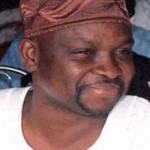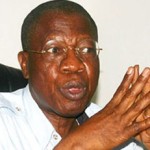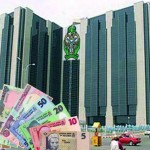EDITORIAL: The National Honours In Want Of Merits
Editorial, Featured, Latest Headlines Friday, October 3rd, 2014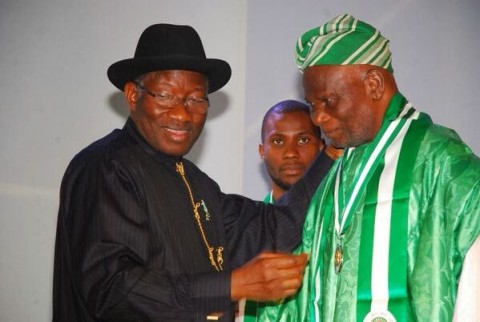
By Tajudeen Balogun, Head, Nigeria Bureau, Lagos
The last Nigerian National Merit Award (NNMA) has held with no significant difference from the previous editions, especially with respect to the very long roll call of the recipients, the corresponding debates as well as unabated questions on the characters who receive the awards, side-by-side the bases.
NNMA was established by Act No. 53 of 1979 and later amended by Act No. 96 of 1992 during former Military Junta of Generals Olusegun Obasanjo and Ibrahim Babangida respectively. The Acts provided that the National Awards be conferred on the “deserving citizens who have contributed outstandingly to the national development,” – in different fields of human endeavours. The law also provides that the President and Commander – in Chief of the Armed Forces of The Federal Republic of Nigeria should confer the awards on the recipients.
President Goodluck Jonathan on Monday, September 29, 2014 during the last National award investiture in the Federal Capital Territory (FCT), Abuja attempted to give impression that the 2013/2014 NNMA was unique, compare to the old, when he remarked “…I have stated last year that the National Awards should not just be a piece of paper or a gallant hang around the neck…” If Mr. President on his own felt the last National award was a departure from the old, I beg to say such thought lacks popularity.
 Mr. President may wish to justify his position by citing examples of awards to the septuagenarian National flag designer, Pa Taiwo Akinkunmi; an Abuja traffic warden;
Mr. President may wish to justify his position by citing examples of awards to the septuagenarian National flag designer, Pa Taiwo Akinkunmi; an Abuja traffic warden;
Corporal Solomon Dauda, another Abuja Taxi driver who returned the sum of N18 Million cash and some personal belongings by a foreigner, Onuh Isaac Michael and the Chief Steward of the Presidential Villa, Abuja, who had served nine Presidents and Heads of State as well as members of the the Golden Eaglets who lifted the FIFA Under-17 World Cup last year.
These are truly awards to the common Nigerians whose past contributions stand tall, free of blemishes and generally applauded within and outside the Nigerian shores. Indeed, the contributions of these outstanding men and women have one time or the other earned Nigeria esteemed positions and put her in good light. Yet, how many of them or what is their per percentage in the long list of the over 300 awardees?
Surely, the public outcry and rationality questions being asked on the awards would not have been so overwhelming if those who finally determined the award recipients had reasoned in the same direction with the discerning Nigerians.
For instance, despite the fact that the country still battles with the challenges of insecurity, with additional problems of inconsistency in information dissemination, alleged problem of corruption in the various security institutions, which has resulted to high level of indiscipline among the heads and men in the uniform and most unfortunately the recent strange developments in the country’s security circle – conviction of 12 soldiers and another 76 men to be tried by court martial in quick stead for mutiny, all the security Chiefs, including Chiefs of Defence staff, Chief of Army Staff, Chief of Naval and Air Staff as well as the Acting Inspector General Of Police (IGP) were on the list of the award recipients.
Given the nature of their jobs, ordinarily these men are due for such honour. But how justifiable in the present circumstances in the country? On what factors or grounds were the honours conferred on them and why the coincidence – awards coming at the same? Awards to these Security Chiefs would have been inspiring if public is privileged to know one or two historic, outstanding, unique achievements or bold initiatives that have been taken before or now by any or all of them, which would have called for or merited the honours. If the issue is about appreciation (for what anyway?) or mobilization; of what effects or impacts is the encouragement to heads whose subordinates (the foot soldiers) were neglected, abandoned and subjected to harrowing experience on the battle fronts?
What an irony? The country security field officers are getting more of the Presidential promises of a better tomorrow, while their heads are not only regularly and well remunerated, but were also being given National recognition. Again, in the face of the serious security lapses in the country and despite the huge votes as well as imbalance achievement, there is need for clarification for the honour conferred on these men, if what Mr. President is anything to go by.
Another aspects of the last National Honours that calls for concern are the awards to some civilians. An example is the outgoing Governor of Ekiti state, Dr. Kayode Fayemi. This is a politician belonging to the opposition party. Again, the question is what are the factors used to adjudge his past or present records which made him qualify for the honour? Can the question be asked why did Fayemi deem deserving to receive such honour based on the supposedly established remarkable records lose governorship election recently conducted in his state? What are the factors adduced for the awards given to his counterparts in other states, who have been ironically assured of being re – elected as Governor or getting automatic ticket to actualize their next political ambition?
Yet, among the recipients at the last National awards investiture was the maverick former Deputy Governor in one of the South Western states; an ex-Senator, ex member of the opposition and now of the ruling party. This politician is widely acknowledged to be a trail blazer in his chosen profession, yet many of his very untoward political approach. No one wishes for a repeat of many of the uncivilized, daring impunity, unrestricted desperation and obvious disrespect for the right of others, displayed by him and heavily and tactically supported by his party during the recent gubernatorial election of his state.
So, for what purpose or on what ground is the National award conferred on this type of character. Generally, this fellow, to a large extent and for some years now is not known with any other public service than being a politician. So was the award given to him based on the services rendered to the country which of course remained unclear to many or a compensation for the outcome (now history) of the election he recently contested, but lost or a political patronage?
What about the former Inspector General Of Police (IGP) Ogbonnaya Onovo who was retired majorly due to lack of clues by the Police authorities under his headship, to counter and subdue the rampaging and dreaded Boko Haram insurgents. Just like it is presently being witnessed, Onovo’s tenure as IGP witnessed wanton loss of lives and property in the North Eastern and other parts of the country. To cap it, he is now a card carrying member of the ruling party. So, what or which Onovo’s pedigree actually merited the national honour being conferred on him? There are so many personalities whose inclusion in the award list demands for fundamental questions regarding the reasons and criteria for the recognition.
As the questions and answers on the merits of the national honours linger, still, the bitter truth is that there is a total disconnection from Mr. President’s wish for standardization of the awards, his pass mark remarks on that; most of the recipients and main purposes the honours were instituted, culminating in loss of deserving prestige, regards and respect by members of the public for the awards. In other words, as established earlier, the last NNMA was not significantly different from the previous.
Really, the standard and manner of the awards need a review and total overhauling. Since the next national award is expected to hold after the next general elections, these recommendations are essentially meant for the incoming administration.
For the national awards to attract the desirable accolades and respect, the incoming government must jettison politics, as so many of the previously honoured including the latest were mostly political compensation, patronage, motivation, cooperation and appeal. Nigerians would recall the likes of the late literary icon, Professor Chinua Achebe and few others have once declined invitation to receive the National awards.
Possibly, the review should henceforth restrict conferring of the awards on the serving political office holders as well as career officers. Instated, if any of the mentioned categories deserve the honours, that can be done after leaving office, using the documented outstanding records as reference. And in case of death before the honour, there can always be post humous award.
Most importantly, the long list of the honoured must also be looked into. Regardless of number of the states in the country, the challenge of balance in the face of Federal character as well as difficult resolve to resist temptation on undue considerations, the number of the awardees as recorded yearly should be drastically reduced to less than 100. The merits of these among others is that it gives the honour the missing but the deserving reckoning; promotes patriotism and productivity as well as healthy competition in both public and private institutions. Of course, reducing the roll call will also save cost and yield for the country some and more economicgains.
Finally, it is important the incoming government gives a serious and second thought to the subsequent national honours, so as to first to make the investiture truly answers what it is actually referred; stops the needless but recurring debates on many National Honours without merits and very painfully to avoid making a serious national event of this nature a mere jamboree, (to a large extent) it has become.
A Role Model Election For Nigeria?
Congratulations to the Nigeria Football Federation (NFF); the Nigerian football pundits and followers on the successful conclusion of the glass house elective congress. Kudos to the NFF immediate past President, Aminu Maigari and his team for the assignment carried out to the admiration of many and finally well delivered.
Tuesday, September 30, 2014 was the decision day and the venue was Warri, Delta state. The election was keenly contested and in the end – after the second round vote, emerged the winner, former Chairman of Delta State Sports Commission, Amaju Pinnick. The first round saw him polling 25 votes against his distanced rival and former NFA Scribe, Chief Taiwo Ogunjobi who recorded nine votes.
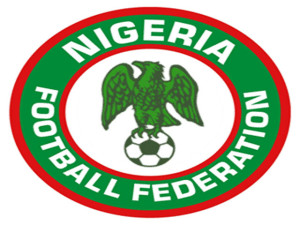 Wether Maigari was eventually cautioned by the role providence played on him in his transiting and troubled era; or he and his former team decided to go the honourable way – the genuine public expectation or only demonstrated the natural stuff he is, his regime has by and large done well in ensuring the election was conducted with all the regards it deserved, hence the calmed nerves and doused tension within and outside the nation’s football house.
Wether Maigari was eventually cautioned by the role providence played on him in his transiting and troubled era; or he and his former team decided to go the honourable way – the genuine public expectation or only demonstrated the natural stuff he is, his regime has by and large done well in ensuring the election was conducted with all the regards it deserved, hence the calmed nerves and doused tension within and outside the nation’s football house.
Kudos to this team. What else? So far we have not heard of any complaint of foul play either from the contestants nor the participants or the observers. No protest so far heard from any quarters except the speculated pre – congress court injunctions restraining the election to hold and which the NFF electoral appeals committee claimed ignorance. Of course, the noise on the so called court ruling has since subsided and I am not really sure whether the public will ever hear about them again.
What else? The world football governing body – FIFA I assumed after its independent findings and assessment of the election, has sent congratulatory letter to the NFF and Nigeria as a whole on the ‘role model’ glass house poll; should I say? Similarly, the new NFF boss Pinnick, has announced readiness and eagerness to work with every stakeholder. Maigari has also boasted he led the best and most eventful regime so far, in the country’s football house. What would you say if you were in his shoes? Go on express yourself man!
Again, an interesting aspect of the election was the contest of Chris Giwa, who was controversially elected NFF President on August 26 in Abuja, but later bow to pressure as well as the immediate past NFF Vice President, Mike Umeh. That the result of the fresh poll did not attract any resentment from either, given their involvement and roles in the four months NFF power struggle, also gives credence to the credibility of the exercise.
Finally, Nigerians have cited repeatedly standardization of the electoral process in different parts of the world, the latest of which was demonstration of unity in diversity in the recent Scotland referendum. If we must come home, the way and manner the NFF election was conducted and ended were enough for the political class to key in. I feel if the glass house stakeholders, the Nigerian public and external body certify the just concluded election in the football house, does it not merit an overwhelming commendation and being adopted as a ‘model’ for the big, general and coming elections? One wishes the Nigerian politicians learn from within and behave themselves.
E-Mail: tjaysuccess10@gmail.com; Twitter: @tajudeen balogun
Related Posts
Short URL: https://www.africanexaminer.com/?p=18236





